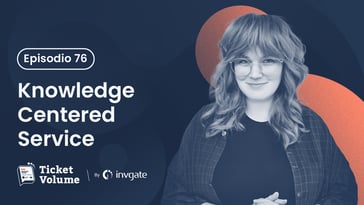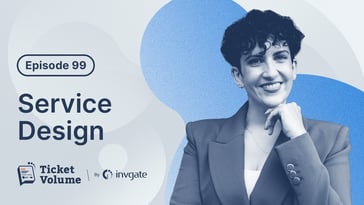A central focus of any business or organization is to build and foster efficient management practices across their teams. This often entails leveraging various frameworks and methodologies tailored to the specific aspects of business operations.
So, what do ITSM, BRM, Agile, and Project Management frameworks have in common? What sets them apart? Are there ultimately better frameworks than others? How do you choose the right one? How do you implement them successfully?
These are some of the questions that guided this year’s first episode of Ticket Volume. Senior Learning Specialist and DevOps Ambassador at QA Ltd, David Tomlinson, came onto the podcast to discuss with our host, Matt Beran, and shared his insights into what to consider when implementing a new framework and what makes a successful project.
Small spoiler: it’s not so much about finding the perfect framework and following it to the letter, but rather adapting to your own context, focusing on competent leaders, and incorporating a strong human factor to the equation.
So, join us as we unwind the main ideas discussed during the episode. Also, remember you can register for our next live webinar at the end of March to discuss multidisciplinary ITSM projects here.

What are ITSM, BRM, Agile, Project Management frameworks?
Although ITSM, BRM, Agile, and Project Management frameworks are united by a shared goal of optimizing organizational processes and delivering value, each one distinguishes itself through its specific focus, methodologies, and targeted outcomes.
So, before anything else, let’s take a look at each one:
- IT Service Management frameworks: ITSM is a comprehensive approach to design, deliver, manage, and improve IT services to meet business needs. Frameworks built for this practice provide guidelines and best practices for implementing ITSM processes effectively, and they include ITIL, COBIT, ISO/IEC 20000, and VeriSM, among others.
- Business Relationship Management (BRM) framework: BRM focuses on fostering mutually beneficial relationships between an organization and its business partners or stakeholders. It involves activities such as identifying stakeholders, establishing communication channels, and managing expectations to enhance business value. The BRM Institute's BRM Body of Knowledge (BRMBOK) provides guidance for this practice.
- Agile frameworks: Agile is an iterative and incremental approach to software development and Project Management, emphasizing flexibility, collaboration, and customer feedback. Agile methodologies, such as Scrum, Kanban, and Extreme Programming (XP), prioritize delivering working software in small, frequent increments, enabling teams to adapt to changing requirements and customer needs quickly. Agile frameworks promote transparency, continuous improvement, and self-organization among cross-functional teams.
- Project Management frameworks: Project Management encompasses the planning, execution, monitoring, and controlling of projects to achieve specific goals within scope, time, cost, and quality constraints. It involves defining project objectives, allocating resources, managing risks, and coordinating activities to deliver desired outcomes. Project Management methodologies, such as Waterfall, PRINCE2, and PMBOK (Project Management Body of Knowledge), provide structured approaches and tools to effectively manage projects from initiation to closure.
Choosing your framework: adaptation and the human factor
Now it’s time to get into the main topics discussed during the episode. David started the conversation by exploring a fundamental question that many – if not all – organizations face: how do you choose the right framework (or multiple frameworks) for your business and how do you implement them successfully.
For David, there is no fundamentally right or better framework. On the contrary, he stated that the two main aspects of a successful project, whichever option you choose to go for, are adapting and tailoring the principles of the framework to your own business operations and focusing on strong communication and good people.
To make his point, the guest argued that, rather than thinking about what makes projects fail, we should be looking at what makes them successful. He believes that most of it has to do with counting on the right people and fostering engagement, effective communication, and common sense across your teams when tackling a project.
David explained that it’s not just about adopting a framework and implementing it blindly, as quite often “we fall in love with the process and forget what it was for.” In this sense, “Doing robotic Agile, doesn’t work. Doing robotic Service Management, where you have CAB every week but don’t actually use your brain” will make for an inefficient system and unsatisfied customers.
So, apart from ensuring that the technical abilities are in place and training your employees to make sure they can confidently work with the framework (which, of course is also important), you should also guarantee they actively communicate, work together, and that they put the human factor into everyday operations.
|
|
"It’s not about the quality of the tool, it’s about the quality of how it’s used. And that’s down to the human decisions that we make. So, invest in humans. The reason why I evolved into the human side of DevOps, because it’s the human side that makes the difference. Because, when the AI overlords come up, they are not going to replace people who have got to bring that together. AI is never going to be the day to day decision making tool that’s going to save your company or organization. It might take away a lot of the drudgery, boring, the stuff we are not very good at. And it’s about playing to the strengths of human beings. And the human being is judgment, communication, empathy, heart. That’s what we are good at, and that raises design and drawing into art." David Tomlinson |
What makes a good manager?
To follow up, another question touched upon during the episode was what makes a competent project manager when it comes to implementing frameworks to build more efficient operations. Here, David shined a light on the importance of project managers working as leaders and putting into action the aspects we explored above: adaptability, communication, and the human factor.
In short, this means building strong teams with good people and effectively engaging with them to keep them motivated on a daily basis. The guest argued that any successful framework, once put into action, must both empower the people involved (most importantly when something might go wrong) and foster periodic adaptability and improvement to make sure the processes are constantly adding value to your organization.
Taking from this, David explained that, for a framework implementation strategy to succeed, it’s important that the project leader, through humility, engagement, and heart, guarantees that every team member is constantly working together towards continual improvement.
|
|
"What is the greatest quality that a service manager needs? Everybody thought it was going to be some ability, knowledge or skill. I said humility. Fundamentally, you have to believe tomorrow can be better than today. But to do that, you have to admit that you didn’t get it as right today as you could have. (...) That fundamental humility, that belief that says, what I did today was good, but tomorrow can be a little bit better is the heart of really good progressive frameworks. All of them see continuous improvement, all of them see getting better at what you do." David Tomlinson |
To sum up
When it comes to incorporating a framework, there is no upfront best option (or combination of options) out there that will do the trick for everyone. Whether it’s ITSM, BRM, Agile, or Project Management you choose to go for, the key lies in ensuring that it meets the needs of your specific team and business operations.
To put it in David Tomlinson’s words, any good framework means applying the principles with common sense and fostering strong leaders and communication between team members.
Here we summarized the main points discussed during the 77th episode of Ticket Volume with. But there’s much more where this came from! You can listen to the full conversation on Apple Podcasts, Spotify, YouTube, or your favorite podcast platform.
And for further insights into the Service Management discussion, register for our next live webinar later this month to discuss multidisciplinary ITSM projects here.















